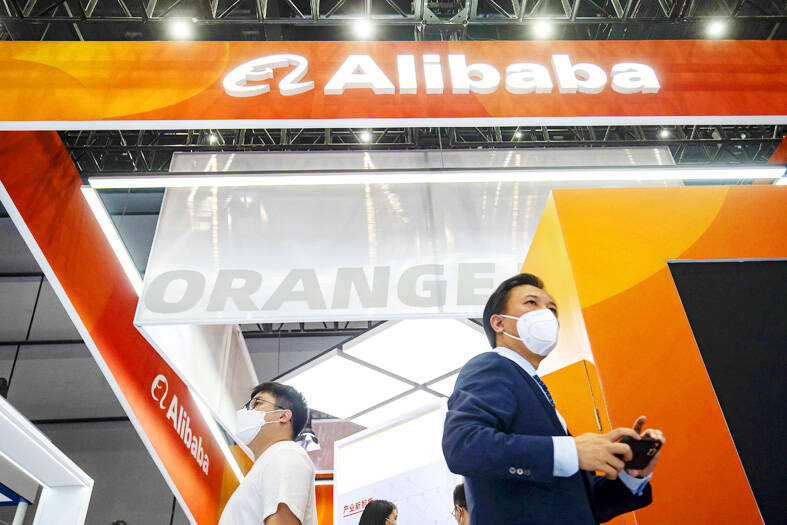Alibaba Group Holding Ltd (阿里巴巴) plans to split its US$220 billion empire into six main units that would individually raise funds and explore initial public offerings (IPOs), in the biggest overhaul of China’s e-commerce leader since its inception more than two decades earlier.
The move frees up the Chinese company’s main divisions from e-commerce and media to the cloud to operate with far more autonomy, laying the foundation for spin-offs and market debuts. Its shares climbed more than 4 percent in premarket trading in New York.
The shift to a holding company structure is rare for major Chinese tech companies. It marks a departure from the Internet company’s traditional preference for keeping most of its operations under one roof, running everything from supermarkets to datacenters under the main Alibaba umbrella.

Photo: Bloomberg
It is also a strong signal that Alibaba is ready to tap investors and public markets, after Chinese President Xi Jinping’s (習近平) administration’s clampdown on Internet spheres wiped out more than US$500 billion of its value.
“The news follows Beijing’s vow to support private sector. If China wants to achieve its 5 percent GDP growth target, they need to support companies like Alibaba,” said Steven Leung (梁偉源), executive director at UOB Kay Hian Ltd (大華繼顯控股) in Hong Kong.
Alibaba’s announcement yesterday coincided with the return of its billionaire cofounder Jack Ma (馬雲) to China after more than a year abroad.
Group chief executive officer Daniel Zhang (張勇) is to head up the cloud intelligence division, a nod to the growing role that artificial intelligence would play in the e-commerce leader’s portfolio in the long run.
Former international retail chief Jiang Fan (蔣凡) is to head up the digital business unit, while longtime executive Trudy Dai (戴珊) takes up the main Taobao Tmall (淘寶天貓) online shopping division. Its other divisions include local services such as meal delivery, the Cainiao (菜鳥) logistics group and digital media and entertainment.
Despite the creation of a half-dozen business lines, Alibaba yesterday reaffirmed the cost-cutting it had pledged to shore up the bottom line.
That was a conservative shift for a tech conglomerate that once spent aggressively to dominate swaths of the economy, reflecting the dissipation of growth since Xi’s crackdown ensued in 2020.
Beijing has cracked down on the country’s tech giants over the past two years, forcing fundamental changes in the business models of companies including Alibaba.
The e-commerce pioneer is also navigating increasingly tough competition from archrival JD.com Inc (京東), as well as up-and-comers such as PDD Holdings Inc (拼多多) and ByteDance Ltd (字節跳動).
“At 24 years of age, Alibaba is welcoming a new opportunity for growth,” Zhang said in a statement. “The market is the best litmus test, and each business group and company can pursue independent fundraising and IPOs when they are ready.”

South Korea’s equity benchmark yesterday crossed a new milestone just a month after surpassing the once-unthinkable 5,000 mark as surging global memory demand powers the country’s biggest chipmakers. The KOSPI advanced as much as 2.6 percent to a record 6,123, with Samsung Electronics Co and SK Hynix Inc each gaining more than 2 percent. With the benchmark now up 45 percent this year, South Korea’s stock market capitalization has also moved past France’s, following last month’s overtaking of Germany’s. Long overlooked by foreign funds, despite being undervalued, South Korean stocks have now emerged as clear winners in the global market. The so-called “artificial intelligence

‘SEISMIC SHIFT’: The researcher forecast there would be about 1.1 billion mobile shipments this year, down from 1.26 billion the prior year and erasing years of gains The global smartphone market is expected to contract 12.9 percent this year due to the unprecedented memorychip shortage, marking “a crisis like no other,” researcher International Data Corp (IDC) said. The new forecast, a dramatic revision down from earlier estimates, gives the latest accounting of the ongoing memory crunch that is affecting every corner of the electronics industry. The demand for advanced memory to power artificial intelligence (AI) tasks has drained global supply until well into next year and jeopardizes the business model of many smartphone makers. IDC forecast about 1.1 billion mobile shipments this year, down from 1.26 billion the prior

People stand in a Pokemon store in Tokyo on Thursday. One of the world highest-grossing franchises is celebrated its 30th anniversary yesterday.

Chinese artificial intelligence (AI) start-up DeepSeek’s (深度求索) latest AI model, set to be released as soon as next week, was trained on Nvidia Corp’s most advanced AI chip, the Blackwell, a senior official of US President Donald Trump’s administration said on Monday, in what could represent a violation of US export controls. The US believes DeepSeek will remove the technical indicators that might reveal its use of American AI chips, the official said, adding that the Blackwells are likely clustered at its data center in Inner Mongolia, an autonomous region of China. The person declined to say how the US government received